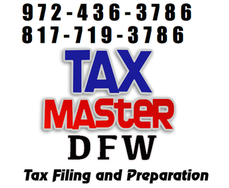Tax Preparation Blog
How does a pre-construction investment affect my taxes? What is Pre-Construction Real Estate Investing?
by Tax Master DFW on 11/25/14
How does a pre-construction investment affect my taxes? What is Pre-Construction Real Estate Investing?
Keywords:
#Arlington_Tax_Preparation, #Tax_Preparation, #Tx_Tax_prep, #Texas_Tax_Preparation, #Arlington_Tax_Prep, #Arlington_TX, #Tax_Prep, #DFW_Tax_Prep, #Tax_Filing, #Taxes, #Lewisville_Tax_Prep, #Lewisville_Tax_Preparation, #DFW_Tax_Preparation, #Arlington, #Tarrant_County, #Reduce_Taxes, #Tax_Refunds, #Pay_Taxes, #Tax_Help, #Bookkeeping, #DFW_Bookkeeping, #Investing, #tax_bookkeeping, #DFW, #Texas, #North_Texas, #Filing_Taxes, #1099, #W-2, #W-4, #W-9
The idea of pre-construction investments when it comes to real estate is actually quite a clever way in which many have made millions. The theory is simple really. Invest in a property before when it is in the planning stage. Those who will be building these buildings need money and investors in order to do get the building off the ground. By investing (in many cases basically purchasing options to purchase) in the units, typically condo units in high demand areas, before the ground is broken investors often have the option of investing for pennies on the expected dollar once the building is complete and can re-sell the property at full market value once the building is complete pocketing the difference in the original investment and the asking price.
This is a win-win situation for many builders or 'owners' of the property in questions because 'pre-selling' the units allows lending agents to have confidence in the viability of the project as a money earner by selling many of the units sight unseen. The benefit to investors is that they are able to purchase at a much lower price pre-construction than afterwards and can sell afterwards at the full market value (or above in some high demand and under saturated areas for real estate).
This style of investing is not nearly as glamorous to some as flipping houses. There are no beast to beauty renovations. There are, however, some things that should be kept in mind while making this type of transaction.
First of all, no real estate venture is ever guaranteed to turn a profit no matter what the glossy little brochures tell you. With the current trends in property sales, this is typically not the best environment for pre-construction investing though these things tend to change on a regular basis and that market could be looking up again in the very near future.
Second, networking is more often than not the best way to break into this particular business. There are all kinds of fly by night would be real estate investors. The ones that manage to last are those that network with other real estate agents as well as those who have specific interests and experience with pre-construction investments. Join local groups in addition to online groups that deal specifically with this sort of investment in order to get more information more quickly. The costs involved might appear daunting at first but they are far less than the costs of getting in over your head by not having a grasp of even the most basic 'ins' and 'outs' of pre-construction real estate investing.
Third, develop a close-knit relationship with a realtor that specializes in this particular type of real estate investing. This could prove to be the most beneficial thing you will ever do in order to insure future success. Be developing the right relationship with the right realtor you can get information on new properties before they make it to the public sector. This puts you in the rare and wonderful position of beating the competition to the punch. This gives you a much better shot at receiving the rock bottom prices that are often missed by waiting too long to make the purchase.
Fourth, be prepared to hold onto the property for a little while if you need to do so. The problem with pre-construction investing is that there are no guarantees that when the time comes you will have been able to 'seal the deal'. Things come up even when you have a buyer that is willing and eager to make the purchase. In other words, there are times when you will need to hold onto the property for a short while and sometimes as a long-term investment. Some options in the case of long-term holds would include renting the property out to vacationers if it is in a high demand tourist area. You can use your realtor to help with that. This allows the property to be earning some income until the sale can be made. Others decided to hold onto the property as a personal vacation home for themselves, friends, and family. In the end, the important thing is that there is a "Plan B" for the property should the deal fall through and you are left paying the monthly note.
Pre-construction real estate investing may not have the 'name in lights' appeal that other types of investing carry but it does provide a viable investment style that has the potential to bring in significant profits. The name of the game when it comes to investing is profits so keep this in mind when considering your investment options. This is one of the forms of investing that requires (in most cases) the least amount of capital up front.
Was that House a Good Investment when you consider the tax implication? The Answer may not be so obvious
by Tax Master DFW on 11/25/14
Title:
Was that House a Good Investment when you consider the tax implication? The Answer may not be so obvious
Word Count:
477
Summary:
I get asked all the time about housing as an investment, and as I talk with people it is amazing how differently people look at it. Forget investment property for the moment and consider how we should evaluate the investment performance of our own homes.
Keywords:
#Arlington_Tax_Preparation, #Tax_Preparation, #Tx_Tax_prep, #Texas_Tax_Preparation, #Arlington_Tax_Prep, #Arlington_TX, #Tax_Prep, #DFW_Tax_Prep, #Tax_Filing, #Taxes, #Lewisville_Tax_Prep, #Lewisville_Tax_Preparation, #DFW_Tax_Preparation, #Arlington, #Tarrant_County, #Reduce_Taxes, #Tax_Refunds, #Pay_Taxes, #Tax_Help, #Bookkeeping, #DFW_Bookkeeping, #Investing, #tax_bookkeeping, #DFW, #Texas, #North_Texas, #Filing_Taxes, #1099, #W-2, #W-4, #W-9
Article Body:
I am surprised how many people do not know the difference between ‘enterprise value’, which is the sales price of a home (debt plus equity), and ‘equity value’, which is what is left at the end of the day when you sell your home and pay off the mortgage. In determining whether this was a good investment for you, it is only the latter calculation that matters.
Most people simply look at how much the value of their home has appreciated since they bought it, and compare it to what they paid. Let us say someone bought a home for $500,000 a year earlier and their neighbor’s identical home just sold for $550,000. Simple math would suggest a potential 10% return in one year (a $50,000 profit on a $500,000 purchase). This, while straightforward, is not an accurate calculation for several reasons.
First, it is critical to factor in transaction costs on the sale of your home and deduct them from the gross sales price to see how much of the sales price you have left. These include what it might cost you to prepare the house for sale (painting, landscaping, staging in some cases, etc.), as well as real estate commissions and other transaction related costs. Let us say in our hypothetical example our seller would invest $10,000 in sprucing the place up for sale, and the real estate commission plus other closing costs on the hypothetical $550,000 sale might be another $33,000 (say 6% of the sales price). Thus that $550,000 sales price results in only $507,000 after these transaction-related costs, implying a mere 1.4% return ($7,000 profit on a $500,000 purchase price), right? Wrong again.
To calculate your investment return you need to compare your profit (or loss) to the equity you have invested, not the entire home price. Let us say you put 5% down to buy the home, which equated to $25,000. Your $7,000 profit in this case actually represents a very attractive 28% return on your investment in only one year. One way smart homeowners can increase their returns is to appreciate how much the return on their invested equity can be enhanced by saving say 1% in the agent’s listing commission. In the example above, a 5% sales commission vs. 6% would have increased our hypothetical seller’s return on their $25,000 of equity investment from the 28% we just calculated to an astonishing 50% ($12,500 profit on the $25,000 investment).
A couple of basic takeaways from this: First, make sure to factor in all costs of a transaction. Second, understand the difference between the aggregate home value and the equity you have invested in the home, which is what impacts your true economic return. Third, appreciate the impact sales-related costs can have on your return. While a $5,000 commission difference seems relatively insignificant in the context of a $550,000 home sale, it is VERY significant in relation to the equity investment in your home, which is the basis of determining your return on your investment.
Why Entrepreneurs Fail. Can a business bookkeeping help you?
by Tax Master DFW on 11/25/14
Title:
Why Entrepreneurs Fail. Can a business bookkeeping help you?
Word Count:
860
Summary:
True entrepreneurs struggle with their business opportunities for a variety of reasons. Among the most obvious are a lack of capital, lack of understanding about marketing, and personnel issues. However, from my own entrepreneurial experience and knowledge of others, there are three major reasons individuals fail in entrepreneurial ventures.
Keywords:
#Arlington_Tax_Preparation, #Tax_Preparation, #Tx_Tax_prep, #Texas_Tax_Preparation, #Arlington_Tax_Prep, #Arlington_TX, #Tax_Prep, #DFW_Tax_Prep, #Tax_Filing, #Taxes, #Lewisville_Tax_Prep, #Lewisville_Tax_Preparation, #DFW_Tax_Preparation, #Arlington, #Tarrant_County, #Reduce_Taxes, #Tax_Refunds, #Pay_Taxes, #Tax_Help, #Bookkeeping, #DFW_Bookkeeping, #Investing, #tax_bookkeeping, #DFW, #Texas, #North_Texas, #Filing_Taxes, #1099, #W-2, #W-4, #W-9
Article Body:
In my 25 + years working with professionals in Business Development, universally I've discovered that they have learned to think like entrepreneurs. This is what has allowed them to rise to the top of their profession. Each would tell you that along the way they have learned how to think differently.
True entrepreneurs struggle with their business opportunities for a variety of reasons. Among the most obvious are a lack of capital, lack of understanding about marketing, and personnel issues. However, from my own entrepreneurial experience and knowledge of others, there are three major reasons individuals fail in entrepreneurial ventures.
They tie the success of their business with their own self worth.
They neglect to set realistic goals and plans for themselves and their business.
They are not prepared to pay the price of success.
True entrepreneurs with the right thinking prevail over a period of time. They have learned to understand the axiom Roles, Goals, and Tolls.
Roles
Successful entrepreneurs, in contrast to those who struggle, have learned to separate their roles in life from their self worth or self-identity. They understand that role performance or failure with their own venture is not a judgment of them as an individual. People who tend to equate their self-worth to their composite role identity are inherently risk-adverse and look to maintain the status quo. Being able to differentiate these two identities allows them to be risk prone vs. risk adverse, a key ingredient to success as an entrepreneur. Individuals who have risked failure, experienced it, and learned from it, have not only learned how to differentiate their role identity from their self-identity, they have learned the lessons of risking and failing. They understand that early failure in ventures is a natural part of successful startups. They are able to embrace those experiences, learn from them quickly and move on. This is critical to success as an entrepreneur. They must be willing to face and deal with early failures in order to prevail over time.
Goals
Even though much is said and written about goals and plans being necessary for success as an entrepreneur, few people learn the mechanics of successful goal setting and planning. It’s not the plan but the planning that is important, and the goal setting process allows them to develop the confidence to take risks and fail. Successful entrepreneurs are not only goal driven and goal oriented; they have learned to execute the process of strategic and tactical goal setting and planning. Visualizing goals, writing them down and putting together a detailed plan for achievement provides the confidence and motivation to prevail. More than just business or operational plans, they have goals and plans for all the important roles in their life. They have learned early that if they are not working their own plan they are probably part of someone else’s goals or plans. They chart their own destiny, embrace risk-taking leadership positions, make adjustments as required and prevail over a course of time.
Tolls
Finally, entrepreneurs understand that there is a toll to pay. To be successful in any role in life you must be prepared to pay full price one time. There are really no overnight successes as an entrepreneur. In fact, I have heard it said that overnight success generally takes 15-20 years. One of the early tolls that entrepreneurs are quite often forced to face is the ‘re-making’ of themselves that can include growing beyond their current circle of contacts. Since most people tend to stay within their own psychological comfort zone, they begin to lose identity with the risk taker. They are comfortable with the type of person who is more like them. Quite often the entrepreneur moves on to a different circle of associates who understand the journey. Stepping out, being your own person and venturing into the risk prone unknown is lonely by itself. Consequently, there can be a newfound stress in old relationships. It’s been said before that pioneers get shot in the front and the back, and only through a process of differentiating role performance from self-worth, being risk prone, prevailing through adversity, sticking to your goals, and adjusting your plans will you be prepared to pay the daily toll.
An entrepreneur has much to learn in order to be successful, including the day-to-day mechanics of running a business, producing products, delivering services, making money and dealing with people. The biggest challenge of all is developing an understanding of themselves. They come to grips with what they want and what motivates them; this sustains their willingness to prevail over the long term against adversity. Successful entrepreneurs have learned to transform their thinking, allowing them to prevail where others fail along the way.
Bill Scheessele is the President, Founder and CEO of Mastering Business Development, Inc., a 25-year Business Development consulting and training company. MBDi consults with firms in the energy, nuclear, engineering, pharmaceutical, IT, and other highly technical service industries helping them build proactive Business Development teams. He can be reached at 704.553.0000 or info@mbdi.com.
Tax Incentives for Saving for Education
by Tax Master DFW on 11/20/14
Title:
Tax Incentives for Saving for Education
Word Count:
366
Summary:
Recent statistics show Americans are simply not saving money for the future. To encourage savings, the government has come up with tax incentives.
Keywords:
#Arlington_Tax_Preparation, #Tax_Preparation, #Tx_Tax_prep, #Texas_Tax_Preparation, #Arlington_Tax_Prep, #Arlington_TX, #Tax_Prep, #DFW_Tax_Prep, #Tax_Filing, #Taxes, #Lewisville_Tax_Prep, #Lewisville_Tax_Preparation, #DFW_Tax_Preparation, #Arlington, #Tarrant_County, #Reduce_Taxes, #Tax_Refunds, #Pay_Taxes, #Tax_Help, #Bookkeeping, #DFW_Bookkeeping, #Investing, #tax_bookkeeping, #DFW, #Texas, #North_Texas, #Filing_Taxes, #1099, #W-2, #W-4, #W-9
Article Body:
Recent statistics show Americans are simply not saving money for the future. To encourage savings, the government has come up with tax incentives.
Tax Incentives for Saving for Education
Higher education in America is an expensive proposition. If you have a child in college, I hardly need to tell you this. While every parent is proud of a child pursuing education, the glorious event can make for some sleepless night when thinking about how to pay for it. If you have young children, the government has taken steps to make saving for college attractive from a tax perspective.
There are a number of different tax incentives to promote saving for education. One such program is known as the Coverdell.
A Coverdell account is designed to promote education savings by removing part of the tax penalty of doing so. The basic idea is that any money distributed from the account will not be taxed so long as distributions don’t exceed the expenses of pursuing education. Here is how it works.
An account is set up for a beneficiary ñ the child. You can open one account per child and contribute up to $2,000 a year. The beneficiary must be under 18. Obviously, this is a long-term strategy since contribution amounts are limited. Nonetheless, here are some key things to understand:
1. Distributions are not taxed, but must be used for education costs such as tuition, books and so on.
2. The school can be public, private or religious and the money can be used as early as elementary school, to wit, this particular platform is not just for college.
3. You can use this strategy in addition to the hope and lifetime learning strategies, i.e., they don’t cancel each other out.
4. If distributions do not go to education expenses or are more than said costs, the beneficiary is taxed like income tax and a ten percent penalty is added.
5. If the beneficiary completes school or does not go, the account may be rolled over to another family member.
All and all, the Coverdell plan is definitely a long-term strategy. Start one now for your young child, however, and you will be happy you did when the tuition bills start arriving.
Tax Quotes and Jokes for Tax Season
by Tax Master DFW on 11/20/14
Title:
Tax Quotes and Jokes for Tax Season
Word Count:
344
Summary:
Like death, paying taxes is inevitable. In the case of most Americans, tax season is just around the corner. If only paying taxes was so easy.
Keywords:
#Arlington_Tax_Preparation, #Tax_Preparation, #Tx_Tax_prep, #Texas_Tax_Preparation, #Arlington_Tax_Prep, #Arlington_TX, #Tax_Prep, #DFW_Tax_Prep, #Tax_Filing, #Taxes, #Lewisville_Tax_Prep, #Lewisville_Tax_Preparation, #DFW_Tax_Preparation, #Arlington, #Tarrant_County, #Reduce_Taxes, #Tax_Refunds, #Pay_Taxes, #Tax_Help, #Bookkeeping, #DFW_Bookkeeping, #Investing, #tax_bookkeeping, #DFW, #Texas, #North_Texas, #Filing_Taxes, #1099, #W-2, #W-4, #W-9
Article Body:
Like death, paying taxes is inevitable. In the case of most Americans, tax season is just around the corner. If only paying taxes was so easy.
As you begin pulling out those receipts, the eraser and reading plain English tax instructions that Einstein couldn’t figure out, you’re going to need a good laugh. Here you go:
1. I am proud to be paying taxes in the United States. The only thing is ñ I could be just as proud for half the money.
2. People who complain about taxes can be divided into two classes: men and women.
3. Like mothers, taxes are often misunderstood, but seldom forgotten.
4. The best measure of a man's honesty isn't his income tax return. It's the zero adjust on his bathroom scale.
5. Next to being shot at and missed, nothing is really quite as satisfying as an income tax refund.
6. A tax loophole is something that benefits the other guy. If it benefits you, it is tax reform.
7. Few of us ever test our powers of deduction, except when filling out an income tax form.
8. What's the difference between a mosquito and an IRS agent? One is a bloodsucking parasite, the other is an insect.
9. It would be nice if we could all pay our taxes with a smile, but normally cash is required.
10. The government deficit is the difference between the amounts of money the government spends and the amount it has the nerve to collect.
11. Taxes: Of life's two certainties, the only one for which you can get an automatic extension
12. What Mae West said about sex is true about taxes. All tax cuts are good tax cuts; even bad tax cuts are good tax cuts,
13. The federal income tax system is a disgrace to the human race. - Jimmy Carter
If nothing else, it is good to know that a former President of the United States feels the same way about taxes as you. If only someone would agree to a flat tax, millions of Americans could dispense with the aggravation and stress of filing taxes each year.








